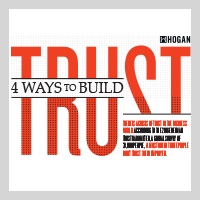 Integrity is an essential quality for leaders. In a Hogan survey of more than 1,000 people, 81% identified trustworthiness as one of the qualities of their best boss, and research ties trust in their leaders to business outcomes like employee engagement, satisfaction, and productivity.
Integrity is an essential quality for leaders. In a Hogan survey of more than 1,000 people, 81% identified trustworthiness as one of the qualities of their best boss, and research ties trust in their leaders to business outcomes like employee engagement, satisfaction, and productivity.
Although you might assume (and your assumption would join the assertions of hundreds of business writers) that in order to gain your employee’s trust, the first step would be becoming more trusting of others, a recent study showed that may not be the case.
In a large meta-analysis of personality and leader performance, Dr. Jeff Foster, Hogan vice president of science, and Dr. Blaine Gaddis, senior manager of product research, found that no significant correlation between scores on the Hogan Development Survey (HDS) scale and ratings of trustworthiness by peers and subordinates.
“In other words, whether or not you actually trust others doesn’t have a significant impact on whether or not other people trust you, at least up to a point,” Gaddis said. “Obviously if you constantly seem paranoid, your followers aren’t going to trust you as much, but the effect isn’t even close to what we see for other HDS scales like Mischievous, Bold, Colorful, or Imaginative.”
And that’s a good thing—because although it sounds horribly cynical, trust may be best in moderation.
Clearly, it’s healthy to exercise a certain amount of skepticism. Trust someone excessively and you risk being naive. On the one hand, between subordinates lying to get ahead or colleagues jockeying for the same promotion, there are plenty of people around you that may be telling you half-truths. On the other hand, if you’re completely unable or unwilling to trust others, you won’t be able to build and maintain relationships.
“This much is pretty intuitive, but it's something we often forget to keep in balance,” wrote Hogan CEO Dr. Tomas Chamorro-Premuzic. “Extreme skepticism may seem to some like an intellectual strength, but it can be as handicapping as unconditional trust. Leaders who are highly skeptical, for instance, may have trouble engaging their teams and wind up demoralizing them instead. Few things are more tiring than having to demonstrate or prove everything to someone who then still fails to believe us.”
To read more about how your personality affects how trustworthy you seem, download our complimentary ebook,4 Ways to Build Trust.